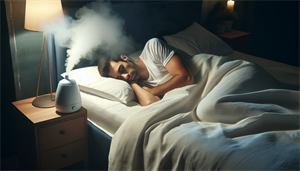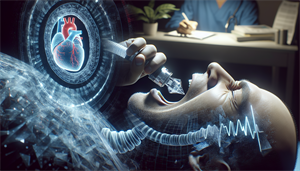Ever woken up with a sore throat from sleep apnea and wondered if it’s connected to your sleep? You’re not alone.
Many individuals with a sleep disorder known as obstructive sleep apnea often wake up with a sore throat. But what’s the connection? And is there a way to alleviate these symptoms? Let’s dive into this fascinating topic!
Key Takeaways
-
Obstructive sleep apnea, characterized by over-relaxed throat muscles leading to airway obstruction, often manifests as a sore throat alongside symptoms like loud snoring and morning headaches.
-
Key symptoms of sleep apnea-related sore throat include excessive daytime sleepiness and loud snoring with breathing pauses, which may indicate the presence of obstructive sleep apnea.
-
Treatment options for sleep apnea-induced sore throat encompass lifestyle changes, Continuous Positive Airway Pressure (CPAP) therapy, oral appliances, and potentially surgery, with advice and management provided by a healthcare team.
Understanding Sleep Apnea and Sore Throat Connection
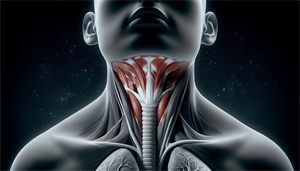
Characterized by an over-relaxation of throat muscles, obstructive sleep apnea is a serious sleep disorder. This results in the narrowing or closure of the airway during inhalation, thereby impeding airflow and causing breathing difficulties. This obstruction can result in snoring, a common occurrence that affects a large portion of the population and is an important factor to consider in the diagnosis of sleep apnea.
Sleep apnea entails more than just snoring. Its symptoms, like dry mouth and morning headaches, frequently result in throat irritation and discomfort, leading to a sore throat.
So, if you’re waking up with a sore throat and experiencing other symptoms like loud snoring and morning headaches, it might be time to consider if sleep apnea is the underlying cause.
Throat Muscles and Breathing
The throat muscles, especially the pharynx, are integral to the breathing process as they enable the flow of air to the lungs. When these muscles excessively relax, it can lead to airway obstruction and throat pain, which is a common symptom of sleep apnea. This is often exacerbated by the transition from light sleep to deep sleep, when the throat muscles relax, causing the tissues in the throat to close in and obstruct the airway, leading to snoring.
The genioglossus muscle, located in the throat, is particularly important in maintaining the patency of the airway during sleep. Excessive relaxation of these muscles can result in the development of obstructive sleep apnea. Ensuring sufficient sleep and addressing sleep apnea can help alleviate symptoms such as sore throat and daytime sleepiness.
Morning Headaches and Dry Mouth
Sleep apnea involves more than snoring and breathing issues. It can also cause morning headaches and dry mouth. But why do these symptoms occur? Morning headaches in individuals with sleep apnea may be linked to decreased blood oxygen levels, though the specific cause is not fully understood.
Dry mouth, on the other hand, can be attributed to mouth breathing, reduced saliva production, and potential mask leaks while undergoing CPAP therapy. This dryness can cause irritation and inflammation in the mouth and throat, leading to a sore throat. So, if you’re experiencing morning headaches and a dry mouth along with a sore throat, it might be time to consider sleep apnea as a potential cause.
Identifying Symptoms of Sleep Apnea-Related Sore Throat

Recognizing the symptoms of sleep apnea-related sore throat is key for timely diagnosis and treatment. One such symptom is excessive daytime sleepiness, likely attributed to mechanisms such as chronic intermittent hypoxia and sleep fragmentation resulting from obstructive sleep apnea. This fatigue can impact daily activities and may heighten the susceptibility to systemic diseases.
Another symptom to look out for is loud snoring. Factors such as being male, overweight, having a narrow airway, and alcohol consumption contribute to the intensity of snoring and the subsequent development of a sore throat. In addition, breathing pauses during sleep serve as a clear indication of sleep apnea, which is closely associated with symptoms of a sore throat, as it signifies the obstruction of the airway during sleep.
Excessive Daytime Sleepiness
Excessive daytime sleepiness, a key symptom of sleep apnea, can interfere with daily activities. The presence of sleep apnea with excessive daytime sleepiness may also elevate the susceptibility to systemic diseases. Excessive daytime sleepiness may indicate the presence of sleep apnea, which can lead to the development of a sore throat as a result of disrupted sleep and frequent awakenings caused by apnea events.
If you’re experiencing excessive daytime drowsiness, it’s imperative to seek guidance from a healthcare professional. Persistent fatigue, sleepiness, and irritability due to this sleep issue necessitate professional assessment and treatment.
Loud Snoring and Breathing Pauses
Common symptoms of sleep apnea, such as loud snoring and breathing pauses during sleep, can result in a sore throat. Snoring can serve as an indicator of obstructive sleep apnea and is often linked to mouth breathing, which can result in dryness and inflammation of the mouth and throat.
Moreover, the presence of breathing pauses during sleep serves as a clear indication of sleep apnea, which is closely associated with symptoms of sore throat, as it signifies the obstruction of the airway during sleep. At home, loud snoring and breathing pauses can be monitored by employing devices that assess breathing and oxygen levels in order to identify and quantify pauses in breathing, also known as apneas.
Risk Factors and Causes of Sleep Apnea-Induced Sore Throat
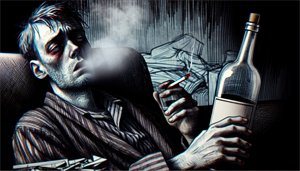
Recognizing the risk factors and causes of sleep apnea-induced sore throat is key to its prevention and treatment. Some common risk factors and causes include:
-
Excessive weight, which can result in the manifestation of obstructive sleep apnea symptoms, including a sore throat
-
Lifestyle habits such as the use of alcohol, sedatives, or tranquilizers, which can heighten the risk of sleep apnea and subsequently lead to a sore throat
-
Smoking, which can also contribute to the development of sleep apnea and a sore throat
By understanding these risk factors and making necessary lifestyle changes, you can help prevent and treat sleep apnea-induced sore throat.
Smoking is a recognized risk factor for sleep apnea-induced sore throat due to its potential to elevate inflammation and fluid retention in the upper airway. Thus, it’s essential to understand these risk factors to ensure early intervention and prevention.
Weight Gain and Obesity
The constriction of the airway due to fat accumulation in the upper respiratory tract, a result of obesity, increases the chances of obstructive sleep apnea. Subsequently, sleep apnea can induce a sore throat as a result of the constriction of the muscles in the posterior region of the throat during sleep.
Indeed, obese individuals are more prone to experiencing sleep apnea and sore throat as a result of the narrowing of the airway caused by fat deposits. Furthermore, recurrent episodes of sleep apnea can lead to hypoxia, which may affect swallowing function and exacerbate throat discomfort.
Lifestyle Habits
Habits like smoking and alcohol consumption can lead to sleep apnea and sore throat symptoms. Smoking contributes to sleep apnea by irritating and inflaming the airways. Additionally, it can cause a sore throat by weakening the immune system and leading to irritation and inflammation in the throat.
Consuming alcohol is associated with sore throat induced by sleep apnea. Alcohol has the effect of relaxing the muscles in the airway, which can result in obstructions and disruptions in breathing while sleeping. Thus, making lifestyle changes can significantly improve sleep apnea symptoms and reduce the occurrence of a sore throat.
Treatment Options for Sleep Apnea and Sore Throat Relief
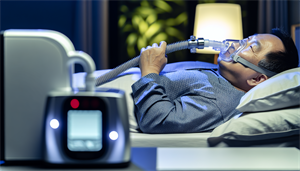
A variety of treatment options exist for sleep apnea and sore throat relief. These include lifestyle adjustments like weight loss, increased physical activity, cessation of smoking and alcohol consumption, and establishing a consistent sleep routine. In addition to these changes, there are also medical interventions such as Continuous Positive Airway Pressure (CPAP) therapy, oral appliances, and surgery that can provide significant relief.
The choice of treatment will depend on the severity of your sleep apnea and your personal circumstances. It’s always best to discuss these options with a sleep specialist who can guide you through the process and help you make an informed decision about your treatment.
Lifestyle Changes
Modifying lifestyle habits can significantly manage sleep apnea and minimize symptoms of a sore throat. These include:
-
Weight loss
-
Increased physical activity
-
Smoking cessation
-
Alcohol avoidance
-
Being cautious with certain medications
-
Adjusting sleep patterns
Regular physical exercise is also beneficial in managing high blood pressure.
Quitting smoking facilitates the healing of airways and enhances the flow of oxygen, thereby potentially alleviating symptoms of sleep apnea and decreasing occurrences of sore throat. Abstaining from alcohol is crucial as it can exacerbate snoring, elevate the likelihood of developing sleep apnea, and worsen existing sleep apnea symptoms.
Continuous Positive Airway Pressure (CPAP) Therapy
Continuous Positive Airway Pressure (CPAP) therapy operates by delivering pressurized air through a mask to maintain airway patency and prevent the collapse associated with sleep apnea episodes. CPAP therapy has been shown to be a highly effective method for reducing snoring, which can alleviate sore throat symptoms.
Positive changes in sleep patterns are frequently observed shortly after commencing CPAP therapy, offering potential for continuous, improved sleep quality. This therapy is particularly beneficial for those with moderate to severe sleep apnea.
Oral Appliances and Surgery
Oral appliances and surgical interventions can also be effective in treating sleep apnea and alleviating sore throat symptoms. Oral appliances aid in the treatment of sleep apnea by maintaining open airways during sleep. They are frequently utilized to advance the lower jaw forward during sleep, effectively reducing snoring and minimizing the likelihood of a sore throat.
In cases where lifestyle changes, CPAP therapy, and oral appliances fail to offer adequate relief, surgery might be deemed as a potential treatment for sleep apnea. Surgical treatments have demonstrated a reduction in sleep apnea severity, enhancement in quality of life, and alleviation of symptoms such as snoring and sleepiness.
Seeking Professional Help: Consult a Sleep Specialist
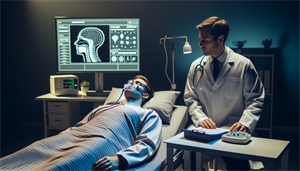
Consulting a sleep specialist is essential in diagnosing and treating sleep apnea and sore throat. These professionals specialize in diagnosing and treating sleep disorders and can provide tailored advice and treatment options based on your specific needs.
The initial action to take when seeking treatment for sleep apnea is to visit a physician. If your snoring is loud and interrupted by periods of silence, it is advisable to consult a healthcare professional.
Sleep Study Process
Sleep studies are diagnostic tools used to identify sleep apnea. They monitor various physiological indicators such as:
-
Brain waves
-
Eye movement
-
Heart rate
-
Oxygen levels
The types of sleep studies used for this purpose include polysomnography and home sleep studies, which can be conducted either in a sleep center or at home.
The standard procedure for excluding obstructive sleep apnea involves a comprehensive medical history and physical examination conducted by a sleep specialist, followed by a critical sleep study which is essential for accurate diagnosis. A home-based sleep study provides convenience and cost-effectiveness, and can serve as a preliminary measure before undergoing in-lab testing for obstructive sleep apnea.
Working with Your Healthcare Team
Collaborating with a healthcare team, inclusive of a sleep specialist, can guarantee appropriate treatment and management of sleep apnea and sore throat symptoms. A sleep specialist plays a crucial role in the diagnosis and treatment of sleep apnea due to their specialized knowledge in sleep disorders, ability to assess symptoms, conduct accurate sleep studies, and recommend suitable treatment options.
The healthcare professionals responsible for the treatment of sleep apnea include sleep specialists, pulmonologists, internal medicine doctors, otolaryngologists, and neurologists. A healthcare team can assist in implementing lifestyle changes to alleviate symptoms of sleep apnea and sore throat by recommending regular exercise, weight loss if overweight, quitting smoking, avoiding alcohol and sedatives, establishing a regular sleep schedule, and altering sleeping position to avoid back sleeping.
Summary
From understanding the connection between sleep apnea and sore throat, identifying the symptoms, recognizing the risk factors, exploring the treatment options, to seeking professional help, we’ve covered a lot of ground. Sleep apnea is a serious condition that can have profound effects on your health and quality of life, but with the right knowledge and guidance, it can be managed effectively. So, if you’re waking up with a sore throat and experiencing other symptoms linked to sleep apnea, don’t ignore it. Seek professional help and take control of your sleep health today.
Frequently Asked Questions
Can sleep apnea give you a sore throat?
Yes, sleep apnea can give you a sore throat, as the condition can lead to breathing through the mouth and the development of a chronic sore throat. It can also create a vacuum effect that pulls stomach acid up into the esophagus and throat.
How do you treat sleep apnea in the throat?
The most effective treatment for sleep apnea in the throat is using a mask at night that transmits increased air pressure into the airway to prevent the throat from collapsing, known as nasal continuous positive airway pressure (CPAP). Another option is a mouthpiece that thrusts the lower jaw forward during sleep. Surgery might be considered in some cases as well.
Can sleep deprivation cause sore throat?
Yes, sleep deprivation can weaken the immune system and contribute to symptoms like a sore throat by reducing the body's ability to fight off infections. It's important to prioritize adequate sleep to support overall immune health.
What are 3 symptoms of sleep apnea?
Common symptoms of sleep apnea include feeling tired upon waking, daytime sleepiness, and snoring. If you experience these, it's important to seek medical advice.
What are the symptoms of sleep apnea-related sore throat?
If you are experiencing excessive daytime sleepiness, loud snoring, and breathing pauses during sleep, it could be symptoms of sleep apnea-related sore throat. Seek medical advice for proper diagnosis and treatment.
